excuse
English > Greek (Woodhouse)
v. trans.
P. and V. συγγιγνώσκειν (dat. of pers., acc., gen., or dat. of thing), συγγνώμην ἔχειν (dat. of pers., gen. of thing), V. σύγγνοιαν ἴσχειν (absol.); see pardon. Overlook: P. ὑπερορᾶν. Justify, defend: P. ἀπολογεῖσθαι περί (gen.); see defend. Let off: P. and V. ἀφιέναι. Excuseoneself: Ar. and P. ἀπολογεῖσθαι. Excuse oneself (from a public duty): P. ἐξόμνυσθαι (acc. or absol.). Decline (an invitation): P. ἐπαινεῖν (acc.) (Xen.; cf. Ar., Ran. 508). subs. P. and V. πρόφασις, ἡ, σκῆψις, ἡ, πρόσχημα, τό. An excuse for: P. πρόσχημα, τό (gen.). Make excuses, v.: Ar. and P. προφασίζεσθαι. Make excuses for: see excuse. Urge as an excuse: P. and V. σκήπτειν (mid. in P.), προβάλλειν (mid. also P.), προὔχεσθαι, προΐστασθαι (Eur., Cycl. 319), P. προφασίζεσθαι, προΐσχεσθαι, V. προτείνειν. You may make such excuses: V. σὺ μὲν τάδʼ ἂν προὔχοιο (Soph., Ant. 80). Way of escape: P. and V. ἀποστροφή, ἡ, καταφυγή), ἡ. Defence: P. ἀπολογία, ἡ.

